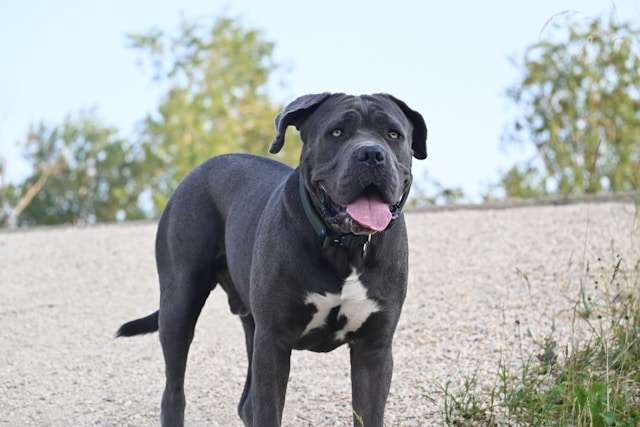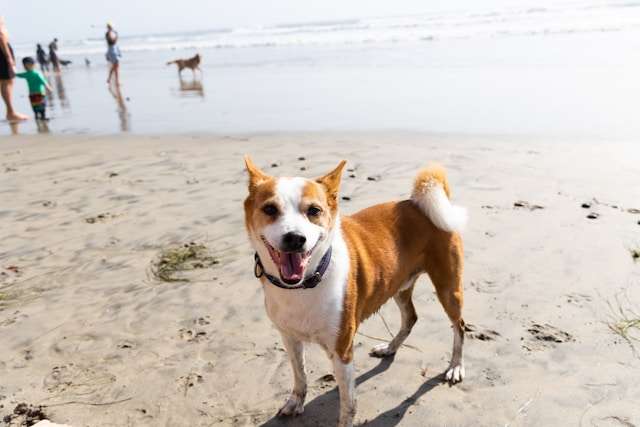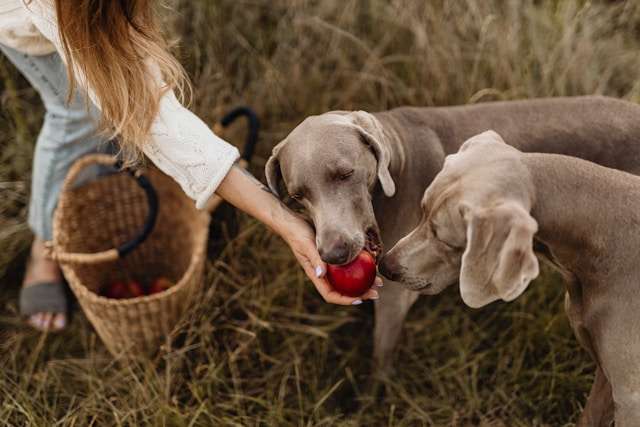Best Dog Food for Dachshunds: A Comprehensive Guide

With their long bodies and small frames, Dachshunds have unique nutritional needs that demand special attention. The right dog food is crucial in keeping your furry friend happy and active, from supporting joint health to managing weight.
If you’re unsure what to feed your Dachshund or want to upgrade your diet, this guide is here to help. For more tips on caring for this breed, you can explore Are Dachshunds Good Dogs? 10 Essential Tips.
Table of Contents
Understanding the Nutritional Needs of Dachshunds
When it comes to feeding your Dachshund, you aren’t just filling a bowl—you’re fueling their little, elongated engine. These adorable dogs have unique dietary requirements to support their build, energy levels, and overall health. Let’s break it down by key nutrient groups.
Importance of Protein
Protein is the foundation of your Dachshund’s diet. It’s what builds and repairs muscle, helps their immune system, and keeps them energized. Dachshunds, active little dogs with strong personalities, need high-quality protein to thrive.
The best protein sources for Dachshunds include:
- Chicken: Lean and highly digestible.
- Beef: Packed with essential amino acids.
- Fish: Loaded with omega-3s for joint health and a shiny coat.
- Eggs: An excellent source of bioavailable protein.
Not all protein is created equal! Avoid by-products that lack nutritional value. Check out Best Dog Food For Every Breed: Tailored Nutrition 2024 for a tailored guide on breed-specific nutrition.
Fats and Their Role
Healthy fats aren’t just an energy source; they keep your Dachshund’s coat silky and joints flexible. Long-bodied Dachshunds are sprinters, not marathon runners, so their diets should include fats for quick bursts of energy.
Key fat sources to include:
- Omega-3 and Omega-6 fatty acids from fish oil or flaxseed.
- Chicken fat is a great energy booster.
- Coconut oil for skin and coat health.
Moderation matters! Too much fat can lead to obesity, a common issue in this breed. For more tips on balancing fats and nutrients, explore the Dachshund Feeding Guide.
Vitamins and Minerals
Dachshunds need a variety of vitamins and minerals to stay healthy and active. Vitamins like A, D, and E are essential for bone health, vision, and immune function. Meanwhile, calcium and phosphorus are vital to keep their bones and teeth strong, especially given their long spine and small stature.
How to ensure your Dachshund gets enough vitamins and minerals:
- Choose high-quality kibble or wet food with added supplements.
- Add veggies like carrots and spinach for natural vitamin boosts.
- Include occasional organ meats (rich in B12 and iron).
Avoid over-supplementing, as it can be harmful. For a deeper dive into the nutrient needs of Dachshunds, you can explore Dachshund’s Nutritional Needs: The Best Foods for Your Pet.
Proper nutrition is a game-changer for your Dachshund. Protein fuels their playtime, fats keep their coats shiny, and vitamins maintain overall health. Keep reading to discover more about crafting the perfect diet for your furry companion!
Recommended Dog Food Types for Dachshunds
Choosing the best dog food for your Dachshund isn’t just about preference; it’s a decision that influences their health and happiness. With their small size and unique build, Dachshunds require a mix of proper nutrition and taste to thrive. Below, we’ll explore some of the top recommended food types so your pup can live their best life.
High-Quality Dry Kibble

Photo by Los Muertos Crew
Dry kibble is a favorite choice for many Dachshund owners due to its convenience and balanced nutrition. High-quality kibbles contain essential vitamins, minerals, and proteins specifically formulated for small breeds like Dachshunds.
Top-rated kibble brands for Dachshunds:
- Royal Canin Dachshund Adult Dry Dog Food: Tailored for Dachshunds 10 months and older, providing joint and spine support. Check it out here.
- Hill’s Science Diet Small Paws: Designed for small and toy breeds, offering a nutrient-rich diet.
- Wellness CORE Small Breed: Grain-free and protein-rich to support energy levels and lean muscle.
Dry kibble helps maintain your Dachshund’s dental health by reducing plaque buildup. However, ensure their water bowl is kept whole, as kibble is low in moisture.
For more tips on feeding small breeds, visit our Dog Breeds and Photos Guide.
Wet Food Options
Wet food can be an excellent option if your Dachshund tends to get dehydrated or is a picky eater. It has a higher water content, which keeps your pup hydrated and more straightforward to chew, especially for seniors or Dachshunds with dental issues.
Benefits of wet food for Dachshunds:
- Provides additional hydration.
- It is palatable and enticing for picky eaters.
- It is easier to chew, making it ideal for aging Dachshunds.
Brands like Blue Buffalo Homestyle Recipe and Merrick Grain-Free Wet Food are popular. Check out The Best Dog Food for Dachshunds 2024 for more wet food suggestions.
Remember that wet food is best combined with dry kibble to balance hydration and dental care. Moderation is key to preventing weight gain.
Raw Diet Approach
The raw diet is gaining popularity, especially among owners looking for natural and unprocessed meal options. This approach typically involves feeding raw meats, bones, vegetables, and certain fruits.
Potential benefits of a raw diet:
- Improved coat shine.
- Higher energy levels.
- Better digestion and reduced stool odor.
However, raw diets come with risks like exposure to bacteria and the need for proper portion control. Consulting your vet before transitioning to raw food is crucial. Explore The Ultimate Guide to the Best Dog Food for Dachshunds for a deeper dive into the raw feeding debate.
If you’re new to crafting raw meals, starting with a blend of commercially available raw diets may be easier to ensure your pup gets all the essential nutrients.
Common Health Issues in Dachshunds and Their Dietary Solutions
Dachshunds are brave, playful companions, but their unique body shape predisposes them to specific health problems. Fortunately, the proper diet can manage or mitigate many of these issues. Let’s explore how what you feed your Dachshund can significantly impact their overall well-being.
Obesity Concerns
Dachshunds love their food, but their small frame makes them prone to weight gain. Carrying extra pounds can strain their short legs and long spine, increasing the risk of joint problems and intervertebral disc disease (IVDD). Managing their weight starts with portion control. Even a little overfeeding adds up quickly for these tiny dogs.
Here’s how you can prevent obesity in your Dachshund:
- Use a measuring cup or scale for precise portioning.
- Provide low-calorie, nutrient-dense foods tailored for small breeds.
- Incorporate green veggies like zucchini or green beans as snacks instead of calorie-laden treats.
- Stick to a consistent feeding schedule to avoid free-feeding habits.
If your Dachshund needs to shed a few pounds, consider switching to a low-calorie dog food. Check out portion control for Dachshunds for more tips on managing meals. For additional information on managing weight in Dachshunds, you can review Dachshund Health Problems and Solutions.
Back Problems and Nutrition
One of the most common health concerns in Dachshunds is intervertebral disc disease (IVDD). Their elongated spines make them more susceptible to back injuries and spinal issues over time. While genetics and physical activities also play a role, nutrition is an essential line of defense.
Certain nutrients can strengthen their bones, joints, and spinal tissues:
- Omega-3 fatty acids: These are found in fish oil, reduce inflammation, and support joint health.
- Glucosamine and chondroitin: These compounds help maintain cartilage and cushion the vertebrae.
- Calcium and phosphorus: Vital for strong bones, especially during their early growth stages.
- Vitamin E and antioxidants Help reduce oxidative stress on the spine.
A diet rich in these nutrients can help prevent or lessen the severity of back problems. For instance, foods fortified with glucosamine and omega-3s are excellent choices. Be sure to limit high-fat treats, as added weight strains the spine further. Learn more about health-focused diets for Dachshunds from Dachshund Dog Breed Health and Care.
Proper care and smart feeding habits can keep your Dachshund’s back strong and durable down the road.
Top Dog Food Brands for Dachshunds
When picking the best dog food for your Dachshund, it’s essential to consider their unique needs. From their long spines to energy requirements, each aspect of their diet matters. Below are some top-rated dog food brands explicitly tailored to these lovable pups.
Brand A – Features and Benefits

Photo by RDNE Stock project
Royal Canin Dachshund Adult might be the perfect fit if your Dachshund struggles with joint health. This dry food is explicitly designed for Dachshunds over 10 months old. It offers:
- Tailored kibble size for tiny jaws.
- Nutrients like glucosamine and chondroitin for joint support.
- Optimal calorie content to maintain a healthy weight.
Royal Canin is a reliable choice to support spinal health and keep your pup active. You can learn more about it at Dog Food Advisor’s Dachshund Recommendations.
Brand B – Features and Benefits
Hill’s Science Diet Small Paws stands out for small dogs with sensitive stomachs. Its formula is perfect for toy and miniature breeds, offering:
- High-quality proteins for lean muscle maintenance.
- Antioxidants for overall health and immune support.
- Omega fatty acids to maintain a healthy coat.
With its veterinary backing and nutrient-dense profile, Hill’s Science Diet makes an excellent choice for Dachshunds. Explore the Best Puppy Food for Mini Dachshund on Reddit for further insights.
Brand C – Features and Benefits
If grain-free options are your focus, Wellness CORE Small Breed delivers premium nutrition. This brand provides:
- A grain-free recipe high in protein for sustained energy.
- Probiotics for digestive health.
- Omega-3 and Omega-6 fatty acids for a glossy coat.
Wellness CORE is known for its natural ingredients, making it a trusted choice for Dachshund owners. Check out The Ultimate Guide to Best Dog Food for Dachshunds to explore this and other top brands.
These brands stand out for their dedication to addressing Dachshund-specific needs. Their tailored nutrition helps promote long and healthy lives for your furry companions.
Tips for Transitioning to New Dog Food
Switching your Dachshund’s diet to a new food can feel tricky, but it doesn’t have to be. A gradual and monitored transition is key to avoiding an upset stomach or other discomforts. Here’s how to do it right.
Gradual Transition Methods

Photo by MART PRODUCTION
When introducing a new food, pace makes the difference. A sudden change can wreak havoc on digestion. Follow these steps to introduce the new diet smoothly:
- Day 1-3: Mix 25% of the new food with 75% of the old food.
- Day 4-6: Adjust to 50% new and 50% old food.
- Day 7-9: Move to 75% new food with 25% old food.
- Day 10: Fully transition to 100% of the new food.
Stick to this schedule and monitor how your Dachshund reacts. If they experience loose stool or vomiting, slow the process down even further. Check out How to Switch Your Dog’s Food for more detailed guidelines.
Monitoring for Allergies or Sensitivities
Food sensitivities in Dachshunds can appear during or after a diet transition. Watch closely for these signs:
- Itchy skin or excessive scratching.
- Vomiting or diarrhea.
- Loss of appetite or refusal to eat.
- Behavioral changes, like lethargy or irritability.
If any of these occur, revert to their old diet and consult your vet to determine the culprit. Allergies can sometimes point to specific ingredients like grains or certain proteins. For additional strategies, read Safely Changing Your Dog’s Diet.
A gradual transition and close monitoring will ensure your Dachshund adjusts smoothly while staying energized and happy. For more advice, explore our guide on Top Dog Foods in 2024.
Frequently Asked Questions (FAQ)
Dachshund owners often have a lot of questions when it comes to selecting the best food for their beloved pets. Below, we answer some of the most common concerns to make it easier for you to care for your pup.
How Much Should I Feed My Dachshund?
The food your Dachshund needs depends on age, weight, and activity level. Here’s a general guideline:
- Puppies: Feed 3–4 small meals daily to support their growth.
- Adults: Typically, 2 meals a day is enough for Dachshunds over a year old.
- Seniors: Stick to 2 meals, but consult your vet for portion adjustments.
Always follow the feeding instructions on your dog’s food packaging for more tailored advice. To learn more about portion control and proper feeding schedules, visit Dog Breed Guide: Find Your Perfect Companion.
Can Dachshunds Eat Grain-Free Dog Food?
Dachshunds can thrive on grain-free dog food if it meets their overall nutrient requirements. Grain-free diets are beneficial for dogs with grain sensitivities or allergies. However, ensure the food has the right protein and fat levels to match your Dachshund’s needs. For inspiration, check out this breakdown of various diet types on What I Feed My Active Dachshunds to Help Keep Them Healthy.
What Ingredients Should I Avoid in Dachshund Dog Food?
Not all dog foods are created equal. Dachshund owners must avoid ingredients that add little to no nutritional value, including:
- Fillers: Corn, soy, and wheat by-products.
- Artificial Additives: Colors, flavors, and preservatives.
- Excess Sugar: Avoid foods that list sweeteners in their top ingredients.
- Low-Quality Meat By-Products: Choose food with named protein sources like chicken or beef.
Reading food labels carefully will help you avoid harmful ingredients. For more detailed information, explore dachshund dog food basics.
What Treats Are Safe for Dachshunds?
Treats are great for training and bonding but should only make up 10% or less of your dog’s daily caloric intake. Safe options include:
- Carrots and Blueberries: Low in calories and high in nutrients.
- Commercial Dog Treats: Opt for ones designed for smaller breeds.
- Freeze-Dried Meats: An ideal high-protein snack.
When in doubt, ask your vet for recommendations on treats that align with your Dachshund’s dietary needs. For more tips, see Top Treats for Dachshunds.
Is Wet Food or Dry Kibble Better for Dachshunds?
Both have their benefits, and the choice depends on your Dachshund’s needs:
- Dry Kibble: Good for dental health and convenient for portion control.
- Wet Food: Great for hydration and easier to digest, especially for older dogs.
Some owners even mix the two to get the best of both worlds. Explore the article Best Dog Food for Miniature Dachshunds for additional expert insight.
The correct feeding choices can easily enhance your Dachshund’s health and energy levels. Try experimenting with these guidelines to find the perfect routine for your four-legged friend.
Conclusion
Your Dachshund deserves food that keeps them healthy, active, and happy. Choosing the right dog food improves their diet and overall quality of life.
Whether it’s kibble, wet food, or a balanced raw diet, focus on high-quality ingredients designed for small breeds. Look for options that support their joint, spine, and weight management needs.
Feeding your Dachshund isn’t just a routine; it’s a way to show care and love. Ready to learn more about caring for your pup? Check out Are Homemade Diets For Dogs Safe And Worth Trying? for more helpful tips.
Make informed choices and enjoy a long, joyful life with your companion!






